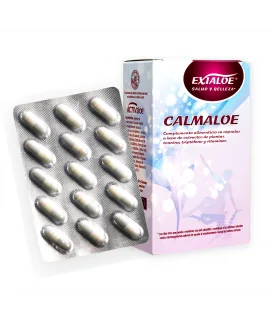
Improve your mental health: the influence of habits
We want to talk to you about a topic that we are passionate about and that interests us all: the relationship between our daily habits and our mental health. In this article, we will also mention nutrition, because what we eat has a much greater impact on our brain and emotions than we might imagine.
We live in a fast-paced and constantly changing world, full of stress, worries, and demands. That's why it's easy to feel overwhelmed, anxious, or "burned out," feeling like we lack the strength. But did you know that we can make small adjustments to our habits that will help us feel better inside?
Healthy Mind in a Healthy Body
The health of our body is closely related to that of our brain. Surely we have heard the phrase "a healthy mind in a healthy body," and it is not without reason. Reasonable good habits can help us feel better. What kind of "good habits" are we talking about? We are talking about habits that we can all achieve, perhaps with some adjustment in our daily routine, and that have a positive impact on our well-being. Among others, there are 3 key habits for our brain:
1. Regular Exercise: Exercise is like an energy bar for our brain. Practicing it releases endorphins, serotonin, dopamine, norepinephrine, and anandamide, responsible for making us feel "good," improving our mood. Plus, that effect lasts over time. Exercise reduces hormone levels like cortisol, which is related to stress, improves mood and self-esteem, reduces anxiety and depression symptoms, improves brain function by increasing blood flow, and enhances memory, concentration, and mental sharpness, as it makes us release neurotrophins, proteins that favor neuron survival.
How much exercise should we do? For children and adolescents, 60 minutes daily of moderate or high intensity is recommended, and for adults, 150 minutes per week of moderate intensity or 75 of high intensity. How to distinguish between moderate or high intensity? Generally, if you're sweating, it's moderate intensity, and if you can't hold a conversation, it's high intensity.
2. Sleep Enough. Sleeping well helps us maintain hormonal balance, learn and retain new information, prevent diseases, take care of the heart... So many benefits! And how much do we need to sleep? School-age children need at least 10 hours daily, adolescents 9 or 10, and adults 7 to 8.
It's important that the hours we sleep are of quality. Has it happened to you or do you know someone who says they spend 8 hours in bed every night but feels tired? This could be due to the fact that those rest hours are not being fully utilized... Here are some suggestions:
• Have a Fixed Schedule for Going to Bed and Waking Up, even on weekends. When our body gets used to the same schedule, it's easier for it to fall asleep and rest better at night.
• Achieve the Right Environment. The place where we sleep must be dark and quiet. The bed should be as comfortable as possible, and it shouldn't be too cold or too hot. This will favor deep sleep.
• Avoid TV, Phone, Tablet... in Bed, preferably 1 or 2 hours before sleeping. Modern screens emit blue light, the same as sun rays when in contact with the atmosphere. Our brain interprets that light as if it were still daytime, making it harder for us to fall asleep.
• Don't Dinner Too Much or Drink Coffee or Alcoholic Beverages Before Bed.
• It's a good idea to consult a specialist if, even making these adjustments, we notice it's hard to sleep and rest.
3. Learn to Manage Stress: Occasional stress is something positive. It's a tool that helps us be more active and have higher physical and mental performance. It's, so to speak, like being at 110%. But isn't it true that forcing a machine (our brain and body) beyond its capacity for a long time doesn't sound positive? That's what happens when we face chronic stress. For this reason, it's very important to learn to control it. Here are some suggestions to achieve it:
• Healthy Lifestyle. As we mentioned before, regular exercise helps reduce the presence of stress-related hormones. Sleeping enough helps us manage emotions better, both positive and negative, and a balanced diet provides our brain with everything it needs to maintain balance.
• Achieve Time and Priority Management. Sometimes we overload ourselves with many tasks. Some are important, and fulfilling them as soon as possible allows us to get a weight off our shoulders. On the other hand, there are less important tasks that we can do when it suits us best, others that we can delegate to other people, or even learn to say "no" to excessive commitments.
• Spend Time with Family and Friends. We are social beings and need to spend time with others to maintain balance. Of course, each of us is different. Some need to spend a lot of time with others and others less. What can we do if it's hard for us to socialize? A good idea is to look for activities in our city that we like. Maybe a group that practices mountain biking? A book club? You're sure to find people who share your hobbies!
• Control Negative Thoughts. If it's our case, it's recommendable to learn to detect recurrent negative thoughts, as they generate stress, and strive to control them and, if possible, avoid them. Then, quickly occupying the mind with something positive has very good results.
Nutrition and Mental Health
Nutrition is a fundamental pillar of our mental health that we often overlook. What we eat becomes our brain, literally, because the nutrients we get from food are the building blocks with which our brain cells are constructed and the fuels it needs to function and regulate our emotions.
How Does Nutrition Affect Our Mental Health?
Mood: A diet rich in refined sugars, saturated fats, and processed and ultra-processed foods can cause blood sugar spikes and drops that destabilize our mood, generating irritability, anxiety, and fatigue. On the other hand, a balanced diet provides us with stable energy and helps maintain a positive mood.
Cognitive Function: Our brain needs specific nutrients to function properly: vitamins, minerals, antioxidants, healthy fats... Lack of nutrients can affect our concentration, memory, and learning and retention capacity. For example, omega-3 fatty acids, present in fatty fish, nuts, and seeds, are essential for brain health and have been associated with improved cognitive function and reduced risk of depression.
Now that we know how important proper nutrition is for our brain's health and, therefore, our emotional well-being, what foods will help us and which ones work against us?
Brain-Friendly Foods:
• Fruits and Vegetables: They are rich in vitamins, minerals, antioxidants, and fiber, essential nutrients for brain health and overall well-being. Which ones to choose?
Did you know that the colors of fruits and vegetables tell us about their properties? Often, red color indicates the food has many antioxidants or yellow shows abundance of vitamin A... So, if you bet on variety of colors on your plate, you'll hit it right! Dark green leaves (spinach, kale), red fruits (blueberries, strawberries), cruciferous vegetables (broccoli, cauliflower), carrots, peppers... The more color on the plate, the more nutrients!
• Fatty Fish: Salmon, sardines... They are rich in omega-3, essential fats for the brain that improve mood and cognitive function. It's recommended to include fatty fish in our diet at least twice a week.
• Whole Grains: Oats, quinoa, brown rice, whole bread... They provide slow-release energy and fiber, helping maintain stable blood sugar levels and feed beneficial gut bacteria, which also influence our mental health!
• Legumes: Lentils, chickpeas... They are a source of plant proteins, fiber, B vitamins, and minerals like iron and magnesium, important nutrients for brain function and mood.
• Nuts and Seeds: Walnuts, almonds, chia seeds... They are rich in healthy fats, proteins, fiber, vitamins, and minerals.
Foods We Can Consume but in Moderation:
• Processed and Ultra-Processed Foods: Fast food, industrial pastries, sugary sodas... They are poor in nutrients, making our body ask for more to feel satisfied, and rich in unhealthy fats, added sugars, and additives, which can harm our mental and physical health.
• Refined Sugars: Present in sweets, sodas... They cause blood sugar spikes and drops that negatively affect our mood and energy.
• Unhealthy Fats: Saturated fats (found in sausages or butter) and trans fats (present in processed and fried foods) can increase inflammation in the body and brain, harming mental health.
Remember that we don't want to become obsessive with food, we love enjoying pizzas with friends! But it is wise to be conscious of what we eat and, little by little, add small changes to our diet that help us feel better. Notice these ideas:
• Start Little by Little. It's not necessary or reasonable to make a diet change from one day to the next. Much more is achieved with small changes, like including a serving of fruit or vegetable a day, drinking one less soda, or changing white bread for whole grain.
• Plan Your Meals. Dedicating 5 or 10 minutes a week to plan what you'll cook and shop will help avoid impulsive decisions and have a balanced diet.
• Whenever you can, cook at home. Cooking can be a creative and relaxing activity, plus it allows us to control the ingredients we'll use and the amount.
Do you know that at Exialoe we have many products to help people have healthy nutrition? Among others, in our store you can find:
Calmaloe. With this product, a formula has been achieved that has excellent activity in the nervous system and on various neurotransmitters, promoting neural balance.
EXI-DHA. DHA ensures that brain cells, eyes, heart, and other parts of the nervous system develop and function correctly throughout all stages of life. The product is presented in triglyceride form, favoring good bioavailability and excellent absorption in the body.
Cuminaloe. They are turmeric extract capsules that have a potent antioxidant and anti-inflammatory action, favoring optimal brain function.
Did You Know... To get from turmeric what one Cuminaloe capsule provides, you would need to eat about 48 servings of curry?
Exialoe Shakes. In our store, you can find a variety of shakes that in one serving provide 50% of all the nutrients our body needs. They ensure our body and brain have everything they need for proper functioning.
Take Care of Your Body, Your Food, and You'll Take Care of Your Mind!
We hope this article has helped you better understand the connection between our daily activity, nutrition, and mental health. Remember that taking care of your habits is a way to take care of your mind and well-being. You may feel that there are many things you need to change after this article. Don't get discouraged! Start with one or two things and, when you're used to it, continue with more. Making certain changes can be like climbing a mountain. It's a lot at once, but if we set the goal of the first 50 meters one week, another 50 the second... When a year has passed, we'll be at the top!
Featured articles
Coffee: Energy, Antioxidants, and Culture in a Bean - Exialoe
Did you know coffee is a top source of antioxidants? It doesn’t just wake you up; it boosts metabolism and protects...Read More
How to Take Care of Your Eyes in the Digital Age
Today, we strain our eyes more than ever. In this article, we discuss the modern challenges facing our visual health...Read More
Successfully Overcome Seasonal Allergies
Do you suffer from seasonal allergies or know someone who does? In Spain, 1 in 4 people are affected, but this year...Read More













